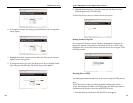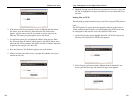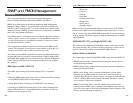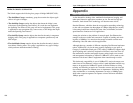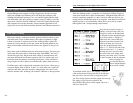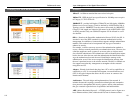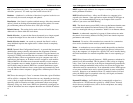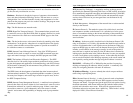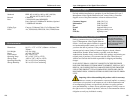
IKE (Internet Key Exchange) - A negotiation and key exchange protocol
specified by the Internet Engineering Task Force. An IKE security association
(SA) automatically negotiates encryption and authentication keys. With IKE,
an initial exchange authenticates the VPN session and automatically negoti-
ates keys that will be used to pass encrypted data over the Internet or any
other network.
In-Band Management - Management of the network from a station attached
directly to the network.
IP (Internet Protocol) - The method or protocol by which data is sent from
one computer to another on the Internet. It is a standard set of rules, proce-
dures, or conventions relating to the format and timing of data transmission
between two computers that they must accept and use to be able to under-
stand each other.
IP Address - In the most widely installed level of the Internet Protocol (IP)
today, an IP address is a 32-binary digit number that identifies each sender or
receiver of information that is sent in packet across the Internet. When you
request an HTML page or send e-mail, the Internet Protocol part of TCP/IP
includes your IP address in the message (actually, in each of the packets if
more than one is required) and sends it to the IP address that is obtained by
looking up the domain name in the Uniform Resource Locator you requested
or in the e-mail address you're sending a note to. At the other end, the recipi-
ent can see the IP address of the Web page requestor or the e-mail sender and
can respond by sending another message using the IP address it received.
IPCONFIG - A Windows NT or 2000 utility that provides for querying,
defining and managing IP addresses within a network. A commonly used
utility for configuring networks with static IP addresses.
IP Multicast Filtering - A process whereby the switch can pass multicast
traffic along to participating hosts.
IPSec (Internet Protocol Security) - A suite of protocols used to implement
secure exchange of packets at the IP layer. IPSec supports two basic modes:
Transport and Tunnel. Transport encrypts the payload of each packet, leaving
the header untouched, while Tunnel mode encrypts both the header and the
payload and is therefore more secure. IPSec must be supported on both
transmitter and receiver and must share a public key. Tunnel mode is widely
deployed in VPNs (Virtual Private Networks).
121
Layer 2 Management 4-Port Gigabit Ethernet Switch
ProConnect II
®
Series
Half Duplex - Data transmission that can occur in two directions over a sin-
gle line, but only one direction at a time.
Hardware - Hardware is the physical aspect of computers, telecommunica-
tions, and other information technology devices. The term arose as a way to
distinguish the "box" and the electronic circuitry and components of a com-
puter from the program you put in it to make it do things. The program came
to be known as the software.
Hop - The link between two network nodes.
HTTP (HyperText Transport Protocol) - The communications protocol used
to connect to servers on the World Wide Web. Its primary function is to estab-
lish a connection with a Web server and transmit HTML pages to the client
browser.
Hub - The device that serves as the central location for attaching wires from
workstations. Can be passive, where there is no amplification of the signals;
or active, where the hubs are used like repeaters to provide an extension of
the cable that connects to a workstation.
ICMP (Internet Control Message Protocol) - Part of the TCP/IP protocol.
Network devices such as routers or servers use ICMP to transmit error mes-
sages and control messages. For example, the PING program uses ICMP.
IEEE (The Institute of Electrical and Electronics Engineers) - The IEEE
describes itself as "the world's largest technical professional society, promot-
ing the development and application of electrotechnology and allied sciences
for the benefit of humanity, the advancement of the profession, and the well-
being of our members."
The IEEE fosters the development of standards that often become national
and international standards. The organization publishes a number of journals,
has many local chapters, and several large societies in special areas, such as
the IEEE Computer Society.
IGMP (Internet Group Management Protocol) - A multicast host registration
protocol that allows any host to inform its local router that it wants to receive
transmissions addresses to a specific multicast group. If there is more than
one multicast router on a given subnetwork, one of the routers is elected
"querier" and assumes the responsibility of keeping track of group member-
ship.
120



